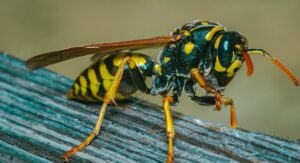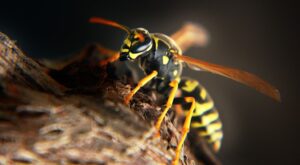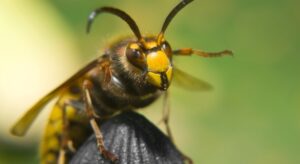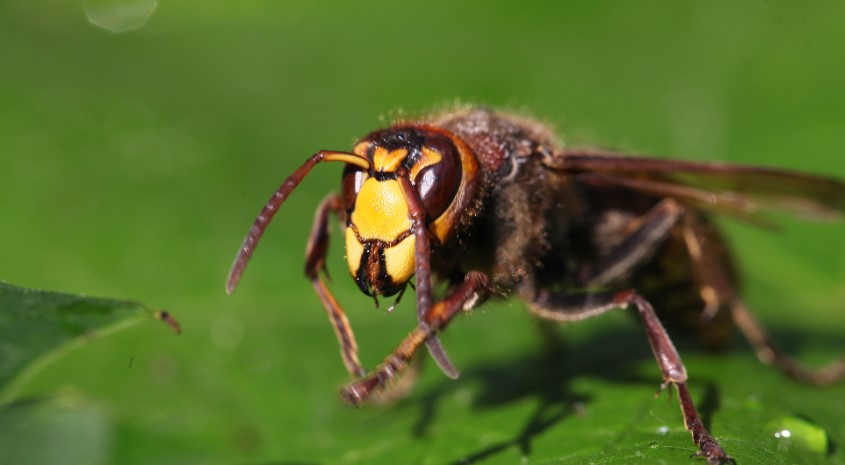Hornets, known for their striking appearance and formidable stings, can be a nuisance around your home. These flying insects are not just a bother during picnics and outdoor gatherings; they can also pose a significant threat to humans. In this blog, we’ll explore what hornets are and why they can be dangerous to humans. We’ll also discuss effective natural methods for getting rid of hornets without resorting to harmful chemicals.
What Are Hornets?

Hornets are large, aggressive, stinging insects belonging to the family Vespidae. They are closely related to wasps and are often mistaken for them due to their similar appearance. However, hornets tend to be larger and have distinct characteristics that set them apart.
One of the most well-known hornet species is the European hornet (Vespa crabro), which measures about 1 to 1.5 inches in length. They are easily identifiable by their yellow and brownish-red colouration and distinctive markings. Hornets have two pairs of wings and a powerful stinger that can deliver painful and sometimes dangerous stings.
Why Are Hornets Dangerous to Humans?
Hornets are generally considered more dangerous than bees and other stinging insects due to their aggressive behaviour and potent venom. Here are some reasons why hornets can pose a threat to humans:
Aggressive Defense: Hornets are highly protective of their nests and can become extremely aggressive when they perceive a threat. They may swarm and attack if you come too close to their nest.
Painful Stings: Hornet stings are known to be excruciatingly painful. Their venom contains chemicals stimulating pain receptors, making the experience even more uncomfortable.
For some individuals, hornet stings can trigger severe allergic reactions, including anaphylaxis. Anaphylaxis is a life-threatening condition that requires immediate medical attention.
Multiple Stings: Unlike honeybees, hornets can sting repeatedly without losing their stingers. This means that if a hornet feels threatened, it can continue to sting multiple times, increasing the amount of venom injected into the victim.
Now that we understand the potential dangers of hornets, let’s explore natural methods to remove them from your property.
How to Get Rid of Hornets Naturally?

When it comes to hornet control, it’s essential to prioritize non-toxic and environmentally friendly approaches. Here are some natural methods to help you get rid of hornets safely.
Natural Methods to Prevent Hornets
Locate and Remove the Nest: The first step is to find the hornet’s nest. Hornets typically build their nests in sheltered areas like tree branches, eaves, or wall voids. Once you’ve located the nest, remove it carefully when hornets are less active at night. Wear protective clothing, including long sleeves, pants, gloves, and a beekeeper’s veil, to avoid stings.
Use Soapy Water: A mixture of soapy water can be an effective and non-toxic way to eliminate hornets. Combine a few tablespoons of dish soap with water in a spray bottle and spray it directly onto the nest. The soap disrupts their protective exoskeleton and suffocates them.
Hang Hornet Traps: Commercial hornet traps can be filled with a sweet liquid to attract hornets. Hang these traps around your outdoor living spaces to capture hornets and reduce their numbers.
Plant Hornet-Repellent Herbs: Certain plants, like mint and eucalyptus, are known to repel hornets. Plant these herbs around your garden and outdoor areas to deter hornets from frequenting those spaces.

Remove Food Attractants: Hornets are attracted to sugary foods and beverages. Keep outdoor dining areas clean and free of spills to avoid attracting them.
Conclusion
Hornets can be a menace around your home, posing both health risks and discomfort for you and your family. By following these natural hornet control techniques and seeking help from pest control services, you can ensure the safety of your home and loved ones while respecting the environment






